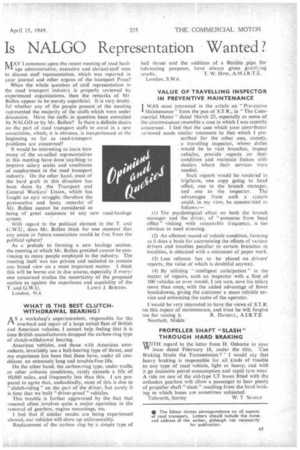Is NALGO Representation Wanted?
Page 13

If you've noticed an error in this article please click here to report it so we can fix it.
MAY I comment upon the recent meeting of road haulIv' age administrative, executive and clerical-staff men to discuss staff representation, Which was reported in your journal and other organs of the transport Press?
When the whole question of staff representation in the road transport industry is properly reviewed by experienced organizations, then the remarks of Mr. Bullen appear to be merely superficial. It is very doubtful whether any of the people present at the meeting represented the majority of the staffs which were under discussion. Have the staffs in question been consulted by NALGO or by Mr. Bullen? Is there a definite desire on .the part of road transport staffs to enrol in a new association, which, it is obvious, is inexperienced at the beginning as far as road-transport problems are concerned?
It would be interesting to learn how many of the so-called representatives at this meeting have done anything to improve salary scales and conditions of employment in the road transport industry. On the other hand, most of the hard graft in this direction has been done by the Transport and General Workers' Union, which has fought an epic struggle; therefore the provocative and hasty remarks" of Mr. Bullen cannot be considered as being of great assistance td any new road-haulage system.
With regard to the political element in the T. and (.W.U., does Mr. Bullen think for one moment that any union or future association would be free from the political sphere?
As a prelude to forming a new haulage section, the meeting at which Mr. Bullen presided cannot be convincing to many people employed in the industry. The meeting itself was too private and secluded to contain any broad view on a most important matter. I think this will be borne out in due course, especially if everyone concerned studies the uncertainty of the proposed section as against the experience and capability of the T. and G.W.U. LANCE J. BURTON. London, N.4.
WHAT IS THE BEST CLUTCHWITHDRAWAL BEARING?
A S a workshop's superintendent, responsible for the overhaul and repair of a large mixed fleet of British and American vehicles, I cannot help feeling that it is time British manufacturers dropped the carbon-ring type of clutch-withdrawal bearing.
American vehicles, and those with American antecedents, invariably use a ball-bearing type of thrust, and my experience has been that these have, under all conditions, an extremely long and trouble-free life.
On the other hand, the carbon-ring type, under traffic or other arduous conditions, rarely exceeds a life of 10,000 miles, and frequently less than this. I am prepared to agree that, undoubtedly, most of this is due to " clutch-riding " on the part of the driver, but surely it is time that we built " driver-proof " vehicles.
This trouble is further aggravated by the fact that renewal often involves quite a major operation in the removal of gearbox, engine mountings, etc.
I feel that if similar results are being experienced abroad, our vehicles will show up unfavourably. Replacement of the carbon ring by a simple type of
ball thrust and the addition of a flexible .pipe for lubricating purposes, have always given gratifying results. T. W. HINE, A.M.I.R.T.E. London, S.W.6.
VALUE OF TRAVELLING INSPECTOR IN PREVENTIVE MAINTENANCE I WAS most interested in the article on Preventive Maintenance" from the pen of S.T.R., in "The Commercial Motor" dated March 25, especially as some of the circumstances resemble a case in which I was recently concerned. I feet that the case which your contributor reviewed needs similar treatment to that which I prescribed for the other one, namely, a travelling inspector, whose duties would be to visit branches, inspect vehicles, provide reports on their condition and maintain liaison with dealers where their services were needed.
Such reports would be rendered in triplicate, one copy going to head office, one to the branch manager, and one to the inspector. The advantages from such a system could, in my view, be summarized as follows:— U) The psychological effect on both the branch manager and the driver, of "someone from head office" .visiting with reasonable frequency, is too obvious to need stressing.
(2) An efficient record of vehicle condition, forming as it does a basis for ascertaining the effects of various drivers and troubles peculiar to certain branches or localities, is obtained with a minimum of paper work.
(3) Less reliance has to be placed on drivers' reports, the value of which is doubtful anyway.
(4) By utilizing "intelligent anticipation " in the matter of repairs, such an inspector with a fleet of 100 vehicles or over would, I am sure, save his salary more than once, with the added advantage of fewer breakdowns, giving the customer a more reliable service and enhancing the name of the operator.
I would be very interested to have the views of S.T.R. on this aspect of maintenance, and trust he will forgive
me for raising it. R, DANIELL, A.I.R.T.E. Northolt, Middx: PROPELLER SHAFT "SLASH" THROUGH HARD BRAKING WITH regard to the letter from H. Osborne in your " issue dated February 18, under the title, Can Braking Strain the Transmission?' I would say that heavy braking is responsible for all kinds of trouble to any type of road vehicle, light or heavy, and with it go excessive petrol consumption and rapid tyre wear A ride on one of the old-type LT buses fitted with the orthodox gearbox will allow a passenger to hear plenty of propeller shaft " slash " resulting from the hard braking to which buses are sometimes subjected.
Tolworth, Surrey W. T SEARLE


























